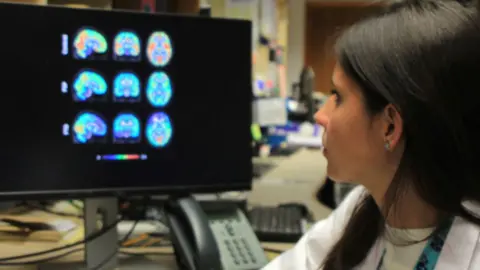Early dementia blood test trial begins
 Race Against Dementia
Race Against DementiaA simple blood test designed to detect dementia decades before it develops is being rolled out across the UK as part of a "very exciting" new study.
University of Cambridge scientists will use the approach to measure brain changes in people with dementia as an alternative to "more costly brain scans".
It is based on initial research led by Dr Maura Malpetti, who received the Race Against Dementia Fellowship in 2021 from the charity founded by Sir Jackie Stewart, in partnership with Alzheimer's Research UK.
The three-times Formula 1 World Championship winner described Dr Malpetti's work as "groundbreaking".
 University of Cambridge
University of Cambridge"By applying the principles of precision, teamwork, and inventiveness from Formula 1 into the world of medical research, we can more efficiently drive progress towards a cure for dementia," added Sir Jackie.
He set up Race Against Dementia following his wife Helen's diagnosis of frontotemporal dementia.
The research will focus on this form of dementia - which is also the type actor Bruce Willis was diagnosed with in 2023 - but aims to help accelerate the development of treatments for other types of dementia.
 Reuters
ReutersDr Malpetti, a senior research associate at the university's Department of Clinical Neurosciences, found molecular changes associated with brain inflammation and dementia can also be detected in the blood, decades before physical dementia symptoms.
They were usually only picked up by "more costly brain scans", the university said.
Brain scans also take longer to carry out and require specialist equipment not available everywhere in the country.
Dr Malpetti described the new trial as "very exciting programme", saying: "We're focusing on changes to the brain which can manifest 10 to 20 years before symptoms, with the hope that in the future we can treat them early enough to stop the disease before symptoms occur."
 University of Cambridge
University of CambridgeDementia mostly affects people over 65, but frontotemporal dementia tends to start at a younger age, though it can affect older people too.
There are about 20,000 people in the UK living with frontotemporal dementia, but Dr Malpetti said because it is less common, people with the condition are often misdiagnosed.
Research has already shown that higher brain inflammation is associated with faster clinical decline in people with frontotemporal dementia, similar to Alzheimer's disease, and Dr Malpetti said this points to the potential of immunotherapy in treating dementia.
Dr Richard Oakley, associate director of research and innovation at Alzheimer's Society, said: "This is another exciting step in revolutionising how we could diagnose the diseases that cause dementia in an early and accurate way.
"A simple blood test could offer a faster, easier method of diagnosis, helping to give people more time to plan and prepare for the future."
The study plans to recruit people from as many different areas and communities of the UK as possible.
It will be based more than 20 research and healthcare centres across to help identify who could benefit most from disease-modifying treatments.
Other dementia blood test trial currently running in the UK include two which are part of the Blood Biomarker Challenge.
Follow Cambridgeshire news on BBC Sounds, Facebook, Instagram and X.
